Marlowsphere (Blog #153)
This is a follow up to my 2016 blog “Kids + Jazz Alive & Well” about the “Jazz for Kids” program at Jazz Standard.
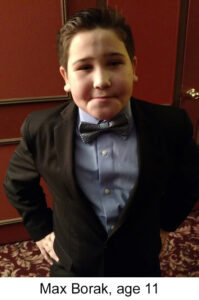 On October 16, 2016 (a Sunday) I visited the “Jazz for Kids” program at Jazz Standard just off 27th Street and Lexington Avenue (Jazz Standard closed in December 2020 after offering a combination of barbecue and jazz since 2002). I arrived at around 11:30 a.m. It was an amazing sight in this leading basement jazz venue.
On October 16, 2016 (a Sunday) I visited the “Jazz for Kids” program at Jazz Standard just off 27th Street and Lexington Avenue (Jazz Standard closed in December 2020 after offering a combination of barbecue and jazz since 2002). I arrived at around 11:30 a.m. It was an amazing sight in this leading basement jazz venue.
The star of the afternoon, for me, at least, was Max Borak, an 11-year-old vocalist who performed Jerome Kern’s Oscar-winning song “The Way You Look Tonight.” Not exactly the kind of tune you would expect an 11-year-old to choose to sing, but then Max Borak is not your usual kid.
I spoke with him briefly after he concluded his rehearsal. Turns out his singing model is Frank Sinatra. Apparently, when he was younger he saw the movie “The Parent Trap” and fell in love with Sinatra’s rendition of the song of the same title. Try to imagine Wayne Newton’s voice in the body of an 11-year-old who is not yet five feet tall. This “kid” displayed poise and audience connection way beyond the norm. His use of the microphone also showed a professional understanding of stage mechanics. I thought to myself, “You’ll hear from him one day.”
Fast forward to December 2021. Keith, Max’s father, reached out to me and asked if I would be interested in doing a follow-up blog about Max. I readily agreed.
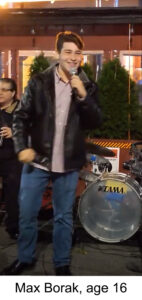 Max Borak is now a junior and a music major at Fiorello H. LaGuardia High School of Music and Art and Performing Arts, one of the specialized high schools in New York City. You have to audition to get in. Following is our conversation:
Max Borak is now a junior and a music major at Fiorello H. LaGuardia High School of Music and Art and Performing Arts, one of the specialized high schools in New York City. You have to audition to get in. Following is our conversation:
EM: How did you feel performing at the Jazz Standard at the tender age of 11 years old?
Max: I felt so gifted to be even close to performing on that stage with all my friends and everybody there cheering me on. It was a dream come true and it was worth every moment of it.
EM: When did you realize you could sing and might sing professionally?
Max: I had always been humming tunes in the back of the car. One day I decided to just open my mouth and see how far I could go. My dad said, “Wait a minute, I hear something. I hear talent.” From that moment on I just knew music was part of my life for good. I was probably maybe five or six.
EM: Why do you sing jazz standards?
Max: I was drawn to jazz standards mostly because of what I feel listening to jazz music. All the swing and all the pop and funk doesn’t get to me as much as jazz. It makes you feel a certain way that you’re somewhere that you can be. You’re on top of the world. You see it all and you have it all. You’re listening to an Ella Fitzgerald record and you just think, my goodness, it’s such a beautiful, beautiful feeling that I’m having.
I listen to some of the Rat Pack, Dean Martin, Sammy Davis Jr. A lot of old classics like that. I’ve been listening to “King Pleasure,” “Moody’s Mood for Love,” all those wonderful songs that I can just riff off of.
I like to consider myself genre-less. I see all music as part of what I come from. But I mostly consider jazz as the single part of my identity that I could never give up.
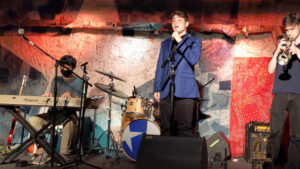 EM: How do you feel attending LaGuardia High School?
EM: How do you feel attending LaGuardia High School?
Max: It takes chops. There is some talent there like you would never believe. I am so blessed to have every day to spend with them, learning and perfecting my craft. I made a promise to myself a while back, when I had the gift of seeing the LaGuardia Jazz Band perform, live, when the Jazz Standard was still open, that I would have the ability to learn more from those knowledgeable people—more than any other people in the City. I got in and got a seat in that school and I’m so glad I did.
There are not necessarily singers in that group, however, the orchestration can take your breath away. There have been plenty of other singers before me that front the jazz band. Currently, I’m the only singer.
EM: What’s in your repertoire?
Max: Songs like “I Thought About You,” “Autumn Leaves,” “Moody’s Mood for Love.” I’ve been thinking a lot about expanding my repertoire, too. Not only in jazz, but I’ve also gotten into a lot of opera music and solo opera performance.
We’ve been rehearsing an oratorio, Handel’s Messiah. We’ve had the privilege of Juilliard representatives actually coming from across the street to give us feedback. I am humbled that they take the time to see us and to speak with us especially because it’s such a prestigious school.
As a junior at LaGuardia comes with a lot of pressure. Not necessarily bad pressure, but there’s a lot of expectation that comes with being a junior. It’s my job to deliver on that and make everything worth it.
EM: Who are some of your teachers? And what kinds of courses are you taking?
Max: I study with Mr. Kevin Blancq, Mr. Darrel Jordan, and Mr. Piali. I’m currently involved in mixed chorus, that is, our chorus is co-ed. That involves tenors, altos, sopranos along with bass tenors which is my range. I’m taking music theory and music history where I’m learning 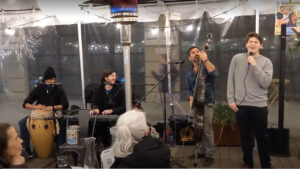 about the greats and their mark on music history. With classical music, however, we do talk a lot about music invention, music instrumentation, and composition. It’s a very free-flowing discussion.
about the greats and their mark on music history. With classical music, however, we do talk a lot about music invention, music instrumentation, and composition. It’s a very free-flowing discussion.
EM: What about after high school?
Max: I’ll be graduating in 2023. I’m looking for further education, hopefully at a conservatory. I’m very open to the possibility of traveling abroad. Maybe signing with an opera company or maybe staying in New York and seeing where my talent really fits. We’re in the land of possibilities, so let that happen.
EM: Where have you performed so far?
Max: I’ve had the pleasure of performing in front of an audience at Lincoln Center and Sardi’s. I’ve done countless street and restaurant shows in the Upper West Side of Manhattan and the Lower East Side. I’ve performed in the La Guardia School itself–in our little theater that we have in the back. Other opportunities that I was involved in include the tree lighting in Rockefeller Center. I was involved in a lot of the Italian cultural events in the Bronx. For instance, I was invited to sing at the San Genaro Feast, the big street fair. I was very fortunate to be invited and sing some Frank Sinatra and Dean Martin songs. Everybody loved it.
EM: Who else in your family has the musical genes?
Max: Surprisingly, nobody else in my family has musical talent. My dad will say he can play lead triangle if he really tried. I like to think most of my musical influence came from my dad’s spectrum of music knowledge. He really guided me towards a lot of what his father was listening to when he was a young boy. It made me so happy to see him smile.”
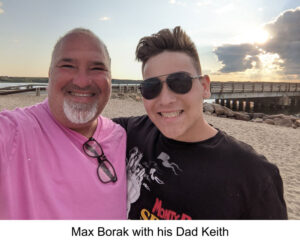 Max’s father, Keith, interjects: “My wife and I didn’t know if we were going to be able to have children. But out popped this beautiful boy with dark hair and light eyes just like my dad. He started humming the songs my dad loved for years when he was about five or six years old. Then he started to sing them. Unfortunately, Max never met my dad. I’ve always felt like he’s been with Max the whole time. He’s named after his grandfather, of course.”
Max’s father, Keith, interjects: “My wife and I didn’t know if we were going to be able to have children. But out popped this beautiful boy with dark hair and light eyes just like my dad. He started humming the songs my dad loved for years when he was about five or six years old. Then he started to sing them. Unfortunately, Max never met my dad. I’ve always felt like he’s been with Max the whole time. He’s named after his grandfather, of course.”
EM: Who are some of your influences?
Max: Of course, I’ve listened to the New School jazz repertoire for a while now. Often when I think about what comes next in my musical career, I’ll look back at those before me who put in the dedication and devotion and were stepping up to the plate. There wasn’t the path written before them, so they had to carve the path to get there.
EM: Have you recorded an album or a single track?
Max: I have never recorded an album but would sure love to. I’ve never quite asked the question of what songs I would pick for my album if I were to do one. Just off the top of my head, I could think of me singing “That’s Life.” Life has ups and downs. I’ve definitely felt that during COVID. I bet everybody has.
EM: What’s been the biggest challenge for you during the pandemic?
Max: The biggest challenge I’ve experienced dealing with my music this year is I lost my grandmother to COVID. She was very dear to me and my father. It took a lot of strength to keep her in my heart even though I was unable to see her. I was too young to see her. To think of her and not feel sad and not feel doubt and not feel like how can I lose my rock? She was very important to not only me, but also to my family. All my family. It really weighed us all down. She had a long life with people who loved her and she cared every moment she had. I saw the good in every moment she was with me.
EM: Do you have a philosophy of life going forward?
Max: There is no point in not trying. If you give it your all and you put everything you have into it, then there is no reason you shouldn’t get there. You deserve success as much as anybody else. You give it your all and you are sure as hell not going to take it from anybody else. If the opportunity is there, why not you? Make it you.
Eugene Marlow, MBA, Ph.D., © 2022

